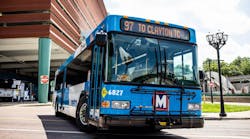St. Louis Metro improving MetroBus service reliability
St. Louis Metro Transit says it is committed to getting back to delivering reliable, on-time service for its customers.
Like many businesses, St. Louis Metro has been impacted by ongoing workforce shortages driven by forces beyond its control. COVID-19 and the highly contagious Omicron variant, as well as highly competitive labor market driven by the Great Resignation, have had dire consequences on the agency’s ability to deliver reliable service for nearly 12 months. Many other transit agencies around the country are also dealing with workforce shortages, especially in bus operators.
St. Louis Metro says it is taking actionable steps to ensure the service it promises to deliver matches the service provided every day. Scheduled service levels are dependent on available workforce and anticipated changes in the marketplace, which is not easily controlled in a COVID-19 environment.
In recent months, St. Louis Metro has had to make difficult decisions about reducing bus service in a measured way, and as the current impacts of COVID-19 accelerate the workforce shortage, the agency needs to further adjust service at this time. For the interim, the service provided may not be the most frequent, but it will be more reliable effective March 21, 2022. The final service details will be available in late February.
Creating reliable service
St. Louis Metro is taking the following steps to improve service reliability:
- Adjusting Missouri MetroBus schedules on March 21 service change to match available workforce and current demand. Six routes will include schedule adjustments to improve connections or change bus stops. Frequency will be reduced on 12 routes, including eight routes where weekday peak-hour service reduced from 15 or 20-minute to 30-minute service.
- Increased operator pay, implemented sign-on and retention bonuses to attract and retain more drivers.
- Recruiting, hiring and training operators is a top priority for the Metro team. The agency says it is regularly graduating classes of new drivers from the training program and will keep people apprised of its progress using a workforce dashboard that will be located on MetroStLouis.org.
- Utilizing qualified managers and supervisors to help offset any shortage of operators.
- Slowing the spread of COVID-19 within the team by requiring temperature checks at the beginning of shifts, providing PPE for team members and mandating masks on all Metro vehicles and at all facilities.
Respecting operators
Operators are working hard to keep the region moving — including working overtime and extra shifts since the pandemic began nearly 24 months ago.
The service adjustment happening March 21 improves the reliability of service, realigns operator demand and provides the team an opportunity to complete recruiting and training. This will allow the agency to right size the service it provides to the St. Louis region well into the future.
Now hiring
St. Louis Metro says it is staying aggressive on recruiting efforts.
The agency adds it is getting back to the basics of providing reliable service delivered by exceptional transit professionals. As the workforce continues to grow, St. Louis Metro will insert additional trips to improve frequency in key times throughout the service day.
